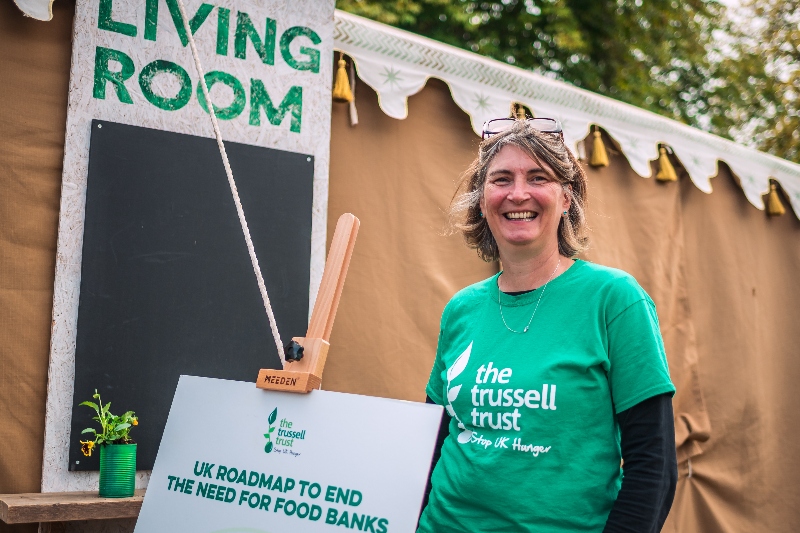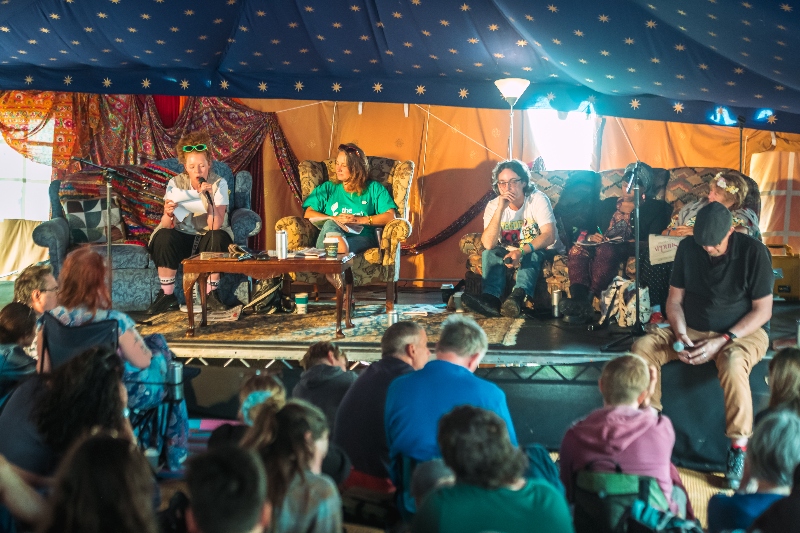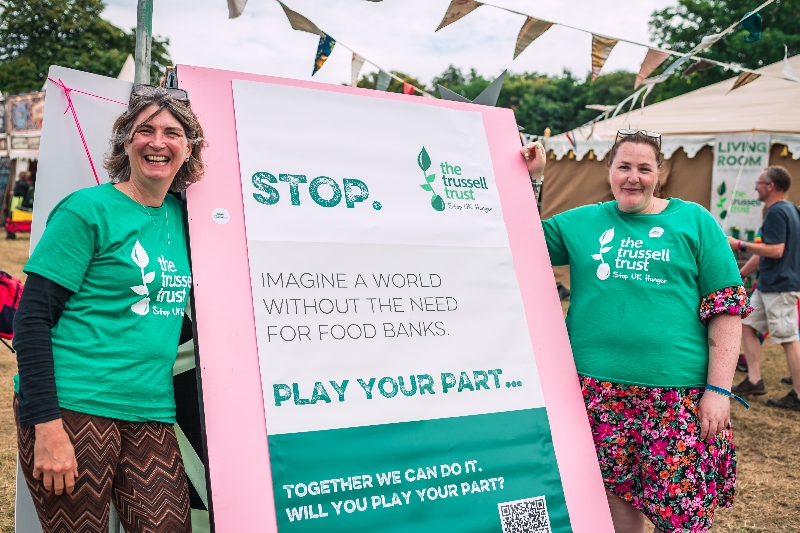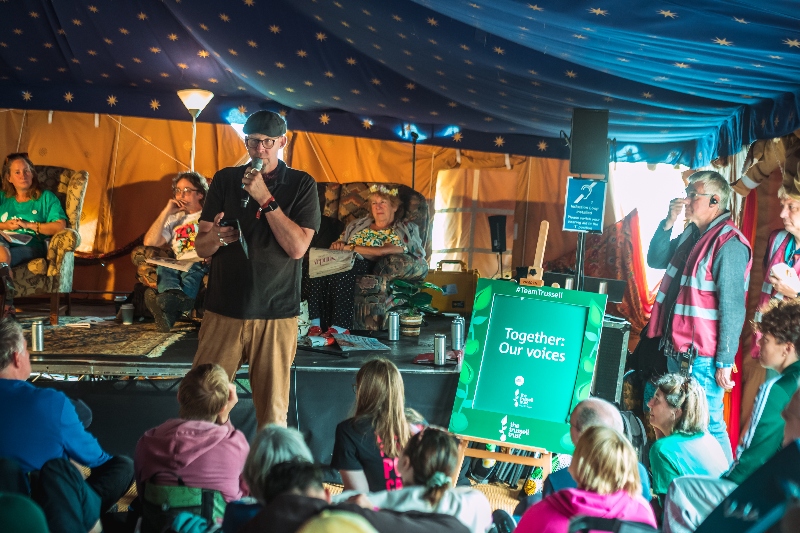'Imagine a world without the need for food banks'
Jessica Foster is head of Church Engagement at the Trussell Trust
In a wide-ranging conversation with The Baptist Times at Greenbelt 2024, Jessica highlighted the charity's campaign for a social security system that protects people from going without the essentials, the loneliness of those using food banks - and emphasised the ways churches can play their part in both advocacy and building community
Interview by Alex Baker
 Can you introduce Trussell Trust's Laying It All Out on the Table project?
Can you introduce Trussell Trust's Laying It All Out on the Table project?
Over the summer we've got these lovely tablecloths and we are gathering stories of hardship and hope, and also sending messages to the new government about the changes we want to see with a particular focus on our current campaign,
‘Guarantee our essentials’. It means churches, food banks, and community centres all over the country gathering stories, getting people together around a table.
And then we're collecting the stories that people write on the tablecloths. We're doing that here at Greenbelt, and we've been at other festivals such as New Wine, the Gather Conference and Wildfires. It’s a great opportunity for people to really share what's most important to them, and to send a message to the new government as they settle in.
As a result, what are the key messages you'll be taking to the Government?
We are really keen that we live in a country without the need for food banks. We don't think it's right that people need to come to food banks. People should have enough money in their pockets to buy the essentials we all need.
The particular issue for us is that Universal Credit is not enough for people to live on. It doesn't add up. There's not enough money coming in for people each month to buy, food to pay for their utility bills, for essential travel, maybe school uniforms and stuff like that.
We are asking the government to set Universal Credit at a level that just meets basic human needs and to guarantee that they wouldn't ever go below; to set it independently and to enshrine it in law, that it will always be enough for people to live on. It doesn't drive people deeper and deeper into poverty, which is the situation at the moment.
Any other notable findings from the feedback you've gathered?
I think one of the things that really shocks me, as someone that goes to church and is a Christian, is that one in four people who've used our food banks haven't had a conversation with anybody, a friend or family member, for a month.
There are many people in this situation.
I would encourage churches to really think about how they build community with people facing financial hardship. We can inadvertently put barriers to belonging. We might expect people to pay to come to social events. We might just assume people can donate to offerings and collections.
We're really keen to see churches become places where people have agency and belong fully - where they have a voice, and are not simply recipients of charity.
 In one of your Greenbelt sessions you spoke about the things that are not working, as well as the glimmers of hope we find. Could you highlight some of these?
In one of your Greenbelt sessions you spoke about the things that are not working, as well as the glimmers of hope we find. Could you highlight some of these?
I think it's two thirds of people who come to our food bank have a disability. So we know that the support for people with disabilities is inadequate and often very slow. We would love to see people with disabilities getting the help they need, the extra help, and carers to be recognised for the work they're doing.
Housing is another big one for us - the need for safe, secure affordable housing. This goes alongside decent and secure jobs that are paid enough. Mental health support as well, something else that it's very hard to get help with. Again, people can get deeper and deeper into poverty while facing mental health challenges.
After a decade in which the number of food banks have grown, is now the time for churches to redouble efforts on the activism side to address the causes of food poverty?
We’ve taken, like many charities,
Micah 6:8 as our theme. So we first say that God tells people to love mercy and we as a network of community food banks couldn't survive without the support of churches. They literally give venues, keep the lights on, donate food, volunteer, serve as trustees. All this is invaluable. We ask churches to keep going for as long as there is a need. This is compassion and loving mercy.
But then we need to act justly. We know that 98 per cent of churches are helping in a compassionate way, but only 27 per cent of churches are involved in campaigning. And we would love to see that number rise.
As people get to know the decision-makers in their own area, their MP, the councillors, get them to listen to what the problems are, think about the systemic solutions and really organise and work for change locally and at a national level, we’re really excited.
We've got a pack for churches on how to get involved with our
‘Essentials Guarantee’ campaign. There are all sorts of
resources on our website for churches on the justice side.
And then there is the walking humbly with God. For us, this means welcoming, including and giving more influence to people who have a lived experience of facing hardship and crisis in all we do. That's the bit that I was talking about before, about community.
We really believe we are no different from the people going to food banks. And actually, we have a lot to learn from people in poverty, about community, about generosity. Building community is good for us all.
 Do you have tips for how churches get more involved in these issues?
Do you have tips for how churches get more involved in these issues?
The first thing we would say is listen to what's going on in your community. Find people who are active, find people that know each other, and start to gather people so that people can learn from each other and hear what it's really like to live in your community. People from all different backgrounds, so gather, make spaces where people can come together. We are really interested in organising, and churches organising in the kind of way that organisations can help by responding to local issues.
And just really opening the doors or through the week and at the weekend. There are so many ways we can make it difficult to come to church. Like if we glare at people, if they come in late, they're not going to come back. If we expect people to dress in a certain way, that can be really off putting.
Think about what we talk about. I was listening to a podcast recently of someone who said, 'I don't go to church anymore because nobody's talking about things that I'm talking about Monday to Saturday.' Let's talk about the things that people are talking about when they're out and about, whether it's at the school gates or in the food bank or in the library. And let's make sure that's at the heart of what we're talking about and offering to God in our worship.
Could you give a sense of the commitment you’ve seen from churches to food banks?
Ninety-eight (98) per cent of food banks, that's 1,200 food banks, are receiving food from churches. I think about two thirds of our volunteers are church based. And we have, I think, about 700 food bank centres housed in churches. So churches are making a huge effort.
And, there are other food banks, warm spaces, and all kinds of things (in churches) that are addressing the issues.

But one of my colleagues with recent experience of poverty has described it as a sticking plaster on a volcano. So it's great what we're doing, but we know we can't sustain it. We know our food banks are at breaking point because of the pressure on them. We know churches are also struggling for funds and people.
So really, it's this campaigning, it's the lobbying, it's looking for change and for being willing to speak out, at every opportunity, to challenge the myths that hold people back. The things such as maybe blaming people for being in poverty, or to suggest that better budgeting is the answer.
Changing the narrative, changing policy, and then changing our communities so that nobody has to use the food bank, because none of us allow it.
No one enjoys walking through the door of a food bank. It's really difficult. And we don't want it to happen.
Jessica Foster is Head of Church Engagement at the Trussell Trust. She is an Anglican Deacon and has worked in interfaith and community development in Birmingham as well as being a tutor and lecturer at the Queens Foundation.
Trussell Trust supports a nationwide network of more than 1,300 food banks. It brings together the experiences of food banks in its network, and their communities, to challenge the structural issues that lock people in poverty, and campaign for change to end the need for food banks in the UK.
It's currently working with the Joseph Rowntree Foundation to call for an Essentials Guarantee within Universal Credit, which means the basic rate at least covers life’s essentials.
This conversation took place at Greenbelt 2024
Alex Baker is a former sub-editor and movie reviewer of The Baptist Times who now works as a photographer, videographer and designer www.alexbakerphotography.com
Do you have a view? Share your thoughts via our letters' page.
Baptist Times, 05/09/2024